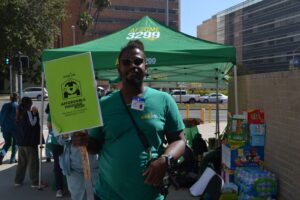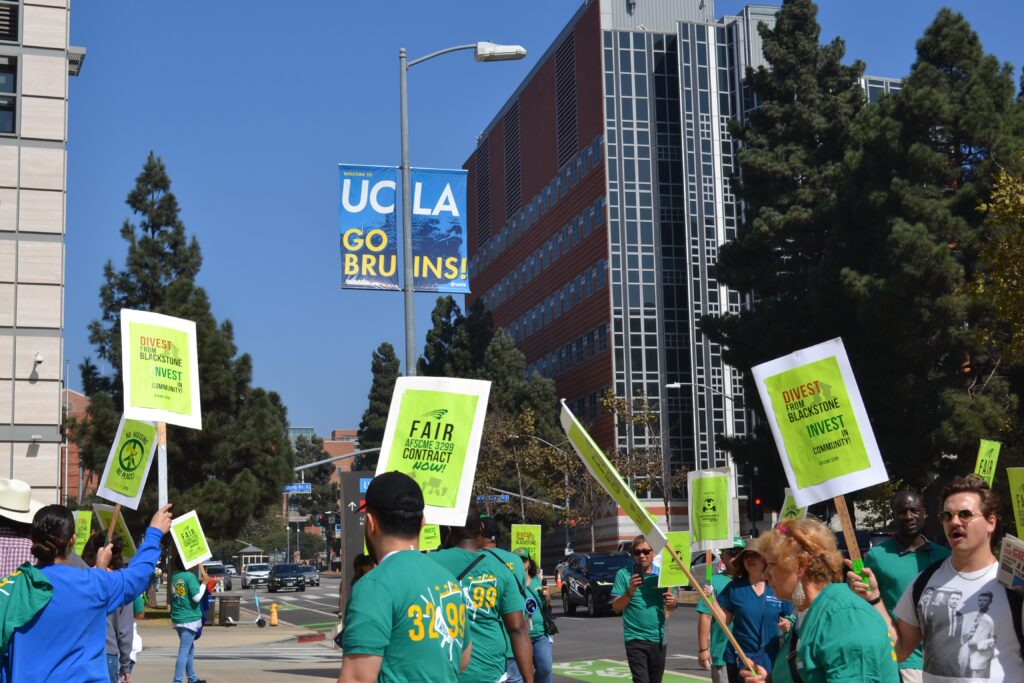(LOS ANGELES) – To draw attention to wage disparities and unsafe working conditions, members of the American Federation of State, County, and Municipal Employees (AFSCME) Local 3299 held an informational picket on Oct. 9 outside UCLA’s Ronald Reagan Medical Center and other locations.
Spread across the 10 University of California medical centers and campuses, hundreds of healthcare workers, including patient care and service employees, gathered on sidewalks to form a picket line. In front of the Ronald Reagan Medical Center, those protesting wore bright green T-shirts, with similarly colored signs reading “No Housing, No Peace!” and “UC Divest from Blackstone NOW!” while chanting out their message, “If We Don’t Get No Contracts You Don’t Get No Peace!”
The protests and rallies were organized in wake of a failed bargaining process on behalf of the universities and the expiration of the contract for patient care workers. This contract included provisions such as paid leave, management rights, and wage terms. The contract, which started in February 2020, expired on July 31 of this year.
The contract for service workers expired on Oct.31. The California Public Employment Relations Board (PERB) and the AFSCME 3299 union filed formal charges against the university system on Oct. 10.

Jacob Niles Greer clinical equipment specialist at the University of California Los Angeles [Credit: Wynter Muro]
AFSCME 3299, which represents over 35,000 University of California service and patient care workers, has been in a year-long dispute with UC administrators over wage increases, staffing shortages, and what union members describe as unsafe working conditions exacerbated by the pandemic. The union has demanded an immediate minimum wage increase of $25 an hour for all healthcare workers and stronger protections against workplace injuries, particularly for those working in high-risk environments.
In 2024 alone, AFSCME 3299 has held 8 meetings pending negotiation with the California university system. The meetings addressed increased wages, paid-leave, safety and well-being in the workplace and healthcare among other proposals.
“Workers are an early warning system for the students and patients who rely on us. The university is creating a dangerous staff vacancy crisis by refusing to pay frontline workers enough to keep pace with rising costs, and by ignoring our pleas for affordable housing solutions so workers can live near their jobs,” said AFSCME 3299 President Michael Avant in a recent press release.
The picket, which lasted for several hours, did not disrupt hospital operations, but the union hoped it would send a strong message to UC administrators. The action comes as part of a broader wave of labor unrest in the healthcare sector, with workers across the country demanding better wages, benefits, and working conditions as a result of the COVID-19 pandemic.
Throughout the day, honks of support from passing cars could be heard as union members waved signs and cheered.
Prior to this picket-line, the UC system released a statement on their website stating, “We fully respect AFSCME’s right to activate their membership of University of California employees. The University and the AFSCME have a rich history of partnership to provide excellence in service and patient care for the UC system.”
However, members such as Creer disagree. “They continue to reward the top with more and more wages that continue to be unprecedented levels of money that we have never seen before, and turn around to give us [laborers] nothing,” he said.
AFSCME 3299’s push for better wages and working conditions at UCLA highlights that of a larger labor movement across California in general, as unionized workers in various sectors—education, healthcare, and transportation—have been increasingly vocal about economic justice and worker protections.
The union has vowed to continue its fight until their demands are met, and organizers hinted that more actions could follow in the coming weeks.


